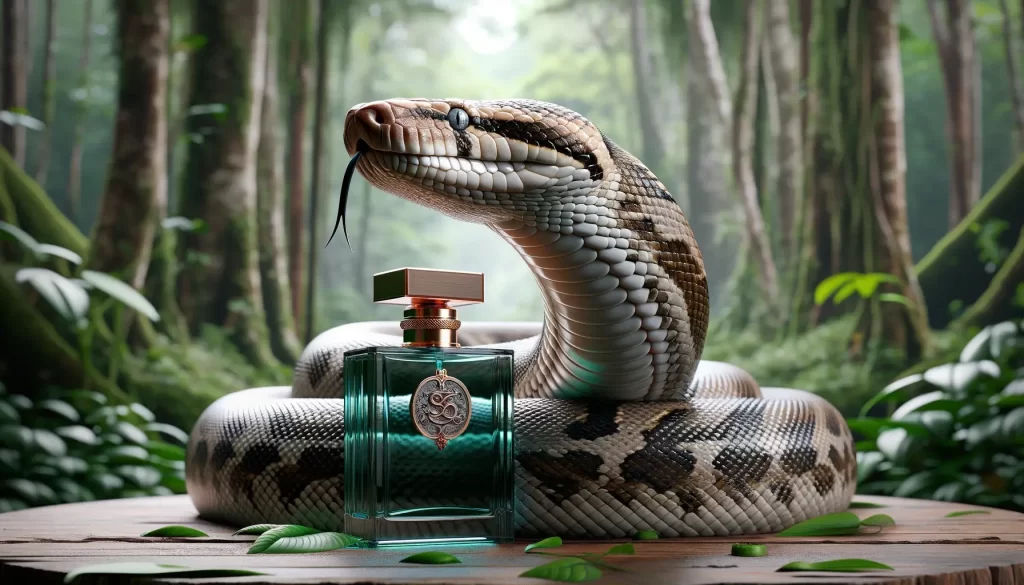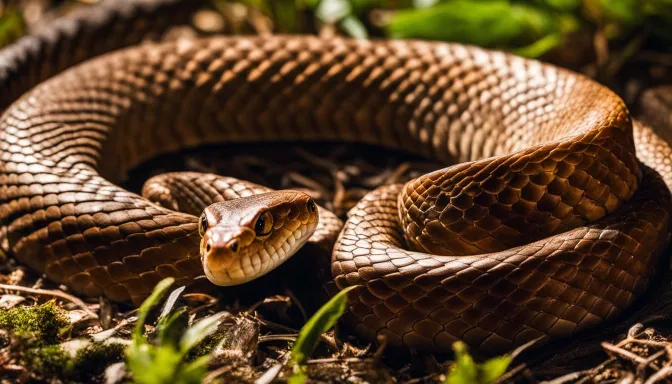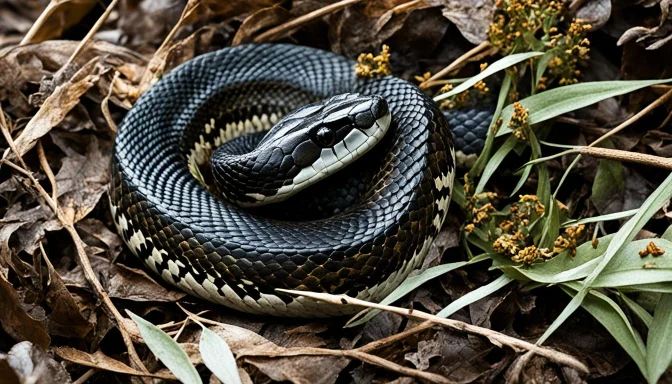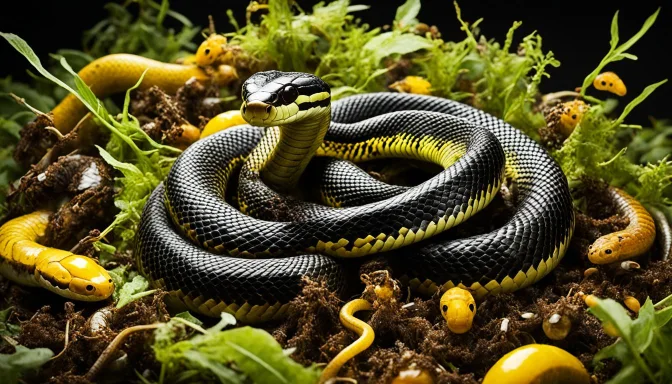
Hello, fellow snake enthusiasts! Today, I want to address a common question that often arises when discussing our scaly friends – do snakes smell bad?
Well, the answer might surprise you.
Yes, snakes do emit a distinct odor, but the perception of their smell can vary among individuals. Factors such as species, diet, and environment can influence the intensity of snake odor.
Let’s dive deeper into the pungent smell of snakes and uncover the truth behind it.
Key Takeaways:
- Snakes emit a distinct odor, but the perception of their smell can vary among individuals.
- The odor serves various purposes, including communication, defense, and warning predators.
- Factors such as species, diet, and environment can influence the intensity of snake odor.
- Snakes, including copperheads, release scent as a defense mechanism when they feel threatened.
- Human response to snake odor can vary widely due to genetics, experiences, and cultural beliefs.
Reasons for Snake Odor
The odor emitted by snakes serves several purposes. It can act as a warning signal to potential predators, deterring them from approaching.
The smell may also help snakes communicate with each other, especially during mating season. Additionally, some snake species produce musk, a potent-smelling secretion that can be used as a defense mechanism.
The musk may contain chemicals that are unpleasant or irritating to predators. Factors that can influence the intensity of snake odor include the species of snake, its diet, and its environment.
Snakes have developed a unique way of protecting themselves in the wild. When threatened, they release an odor that serves as a warning sign to potential predators.
This odor acts as a natural defense mechanism, deterring predators from approaching. It is a way for snakes to say, “I’m dangerous, stay away!”
The intensity of the snake odor can vary depending on the species of snake, what they eat, and the environment they are in.
Another reason for the unpleasant smell emitted by snakes is their ability to communicate with each other. Snakes use scent cues to convey various messages, especially during mating season.
The odor they produce helps them attract potential mates and establish territories. It is an essential part of their reproductive behavior.
Some snake species take their odor-emitting abilities to the next level by producing musk. Musk is a powerful secretion that snakes use as a defense mechanism.
It contains chemicals that are extremely unpleasant or irritating to predators. When a snake feels threatened, it releases musk to deter and distract predators, giving it a chance to escape.
Snake Odor and Copperhead Snakes

When it comes to foul-smelling snakes, copperheads take the spotlight. These venomous snakes, found in certain parts of the United States, are notorious for emitting a strong scent when they feel threatened.
Described by many as unpleasant or foul-smelling, the odor produced by copperhead snakes is believed to come from their scent glands.
When cornered or disturbed, copperheads release defensive secretions from their scent glands as a warning to potential predators.
This strong snake scent is intended to deter any threats and keep them at bay. However, it’s worth noting that not all snakes, including copperheads, emit a noticeable odor.
The intensity of the scent can also vary among individuals and may not always be present.
Copperhead snakes, with their strong snake scent, serve as a reminder of the fascinating and diverse ways snakes have adapted to protect themselves in their natural habitats.
Factors Affecting Snake Odor Perception

In understanding the perception of snake odor, it is important to recognize that individuals can have varying responses due to several factors.
One of the key influences is the sensitivity to certain scents. Some people have a heightened sensitivity, which can make the repulsive odor of snakes more pronounced to them compared to others.
Environmental conditions, such as temperature and humidity, also play a role in influencing the intensity of snake smell.
Higher temperatures can intensify the fragrance, whereas low humidity may reduce its potency. These factors contribute to the overall perception of snake odor.
Diet is another crucial factor affecting snake scent. Snakes consume a variety of prey items, and the odor emitted may vary depending on their diet.
For example, snakes that consume rodents may have a distinct musky smell, while those with a diet primarily consisting of amphibians may have a different fragrance.
It’s essential to acknowledge that snake fragrance is subjective and can differ from person to person.
Factors such as genetics, previous experiences, and personal preferences can influence an individual’s perception of snake odor.
Therefore, what one person may find repulsive, another may not notice or be bothered by it.
Factors Affecting Snake Odor Perception:
- Sensitivity to certain scents
- Environmental conditions (temperature and humidity)
- Diet of the snake
- Individual variations (genetics, experiences, and preferences)
Understanding the factors that influence snake smell perception can help provide a more comprehensive understanding of why individuals may have different reactions to the repulsive odor of snakes.
By considering these factors, we can appreciate the individual variation in how we perceive snake fragrance.
Snake Odor and Predators
The pungent smell of snakes, known as snake stench or snake fragrance, serves as a powerful deterrent to predators.
Many predators have a keen sense of smell and can associate the odor of snakes with potential danger.
The strong scent emitted by snakes can signal the presence of a venomous or aggressive animal, prompting predators to avoid them.
Some predators, such as opossums and certain snake species like kingsnakes and rat snakes, have shown adaptations to tolerate or even enjoy the smell of snakes.
These predators have developed a resistance to the repulsive odor and may even use it as a means to locate and prey on snakes.
Overall, the snake stench plays a crucial role in predator-prey interactions and the survival of snakes in their natural environments.
Snake Odor and Human Perception

The perception of snake odor by humans can vary widely. While some people find the smell of snakes repulsive or offensive, others may not notice or be bothered by it.
This individual variation in perception can be influenced by factors such as genetics, previous experiences, and personal preferences.
It’s also important to consider that human response to snake odor is often influenced by cultural and societal beliefs.
In some cultures, snakes are associated with danger and fear, which may contribute to a negative perception of their odor.
- Some people find the strong snake scent repulsive
- Individual variation in perception depends on genetics, previous experiences, and personal preferences
- Cultural and societal beliefs can influence human response to snake odor
Snake Odor and Snake Behavior

Snake odor is closely linked to snake behavior. When snakes feel threatened or agitated, they may release defensive secretions from their scent glands.
These secretions can produce a pungent smell that serves as a warning to potential predators.
The odor acts as a form of communication, signaling that the snake is prepared to defend itself if necessary.
This defensive behavior and the release of odor are adaptive traits that help snakes survive in their natural habitats.
By emitting a strong and distinct smell, snakes deter predators and increase their chances of avoiding potential threats.
Snakes have evolved to rely on their odor to communicate non-verbally and protect themselves. It’s important to respect snake behavior and give them space to avoid unnecessary encounters.
Interfering with snakes or provoking them can lead to increased defensive behavior and the release of an even stronger and more pungent scent.
Understanding the connection between snake behavior and odor allows us to appreciate the role that odor plays in their survival strategies.
It reminds us to be mindful and cautious when we encounter snakes in their natural habitats.
Snake Behavior and Defensive Postures
When snakes feel threatened, they may exhibit defensive postures as a means of deterring potential predators.
These postures can include coiling, hissing, rattling (in the case of rattlesnakes), or flattening their bodies to appear larger and more intimidating.
Snakes may also strike if they feel cornered or provoked. It’s essential to give snakes ample space and avoid actions that could provoke them.
This not only reduces the chances of snake bites but also ensures that snakes don’t feel the need to release their defensive secretions and emit a strong odor.
By respecting snake behavior and understanding their defensive strategies, we can coexist peacefully with these remarkable creatures in their natural habitats.
How Snakes Detect Odors
Snakes have an incredible sense of smell that allows them to detect odors in their environment. They possess a specialized organ called the Jacobson’s organ, located in the roof of their mouths.
When snakes flick their tongues, they collect microscopic scent particles from the air and transfer them to the Jacobson’s organ.
This organ then analyzes the chemical composition of the scent, providing snakes with valuable information about their surroundings, including the presence of prey, predators, or potential mates.
The ability to detect and interpret odors is crucial for snakes to navigate their environment and find food or mates effectively. It’s a remarkable adaptation that contributes to their survival.
Conclusion
In conclusion, the question “Do Snakes Smell Bad?” is not so straightforward. While snakes do emit a distinct odor, the perception of their smell can vary among individuals.
Factors such as species, diet, and environment can influence the intensity of snake odor. Some people find the smell of snakes repulsive, while others may not notice or be bothered by it.
It’s important to understand that the odor snakes emit is a natural characteristic of their biology.
The repulsive odor of snakes serves various purposes. It can act as a means of communication, allowing snakes to warn predators or potential threats.
The smell can also serve as a defense mechanism, deterring predators from approaching or attacking. In this way, snake odor plays a crucial role in the survival of these fascinating creatures.
Understanding snake odor perception is a complex topic. Individual preferences, genetics, previous experiences, and cultural beliefs can all influence how people perceive the smell of snakes.
It’s essential to respect snake behavior and give them space to avoid unnecessary encounters. Remember, the pungent smell of snakes is an inherent part of their biology, and it is crucial for their survival in their natural habitats.
FAQ
Do snakes emit a distinct odor?
Yes, snakes do emit a distinct odor. The perception of their smell can vary among individuals.
Why do snakes have an odor?
Snake odor serves several purposes, including communication, defense, and warning predators.
Do all snakes have a noticeable odor?
Not all snakes have a noticeable odor. The intensity of the smell can depend on factors such as species, diet, and habitat.
What is the scent of copperhead snakes?
Copperhead snakes are known to emit a strong, unpleasant scent when threatened. This scent is a result of defensive secretions.
Why does the perception of snake odor vary among individuals?
The perception of snake odor can vary due to factors such as genetics, previous experiences, and personal preferences.
How do predators respond to snake odor?
The pungent smell of snakes can act as a deterrent to many predators, signaling the presence of potential danger.
How do humans perceive snake odor?
The perception of snake odor by humans can vary widely, with some finding it repulsive while others may not notice or be bothered by it.
What is the relationship between snake odor and snake behavior?
Snakes release odor as a defense mechanism when they feel threatened or agitated, signaling their readiness to defend themselves.



